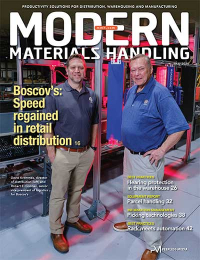Autonomous mobile robots (AMRs) offer modern solution to challenges of traditional farming
Farming technology start-up Hippo Harvest is using AMRs to make greenhouse farming as accessible and productive as outdoor farming.
Farming is hard work, and it’s no stranger to disruptions. In recent years, the physically demanding nature of the job has brought on labor shortages and increasingly severe weather conditions have compromised the efficacy of traditional outdoor farming. Indoor greenhouses have emerged as an alternative, but their perceived high cost and specialized nature have stalled widespread adoption.
Farming technology start-up Hippo Harvest is focused on changing that by improving the accessibility and scalability of controlled environment agriculture (CEA). Led by a team of tech industry veterans, the company leverages advanced plant science, machine learning and autonomous mobile robots (AMRs; Zebra Robotics Automation) to cultivate lettuce that can withstand the challenges posed by droughts, floods and other extreme weather conditions.
“My career up to Hippo Harvest had been technology for technology’s sake,” says Eitan Marder-Eppstein, CEO at Hippo Harvest. “At Hippo Harvest, I’ve had the opportunity to leverage technology for real impact.”
Hippo Harvest was established in 2019 to make food systems more resilient in uncertain conditions. The company partnered with Zebra Robotics Automation to make greenhouse farming as cost-effective and scalable as outdoor farming.
Intrigued by the adaptability of warehouse automation, Marder-Eppstein looked past the traditional vision of AMRs in a warehouse or manufacturing, seeing its potential application in agriculture. “We wanted to build something that gave us more control and flexibility to dynamically harvest or treat plants differently,” says Marder-Eppstein.
Rather than using tractors like in traditional farming, Hippo Harvest uses Zebra’s Fetch AMRs. The mobile robots come with customizable attachments and software to water crops, provide nutrients, move plants, perform sensing and imaging tasks, and even keep the greenhouse clean by vacuuming.
“Zebra’s Fetch100 system is the absolute workhorse of our farm,” says Ivonna Dumanyan, chief business officer at Hippo Harvest. “It’s the platform on which all our capabilities are built.”
Compared to conventional farming, the implementation of advanced technologies has reduced Hippo Harvest’s water consumption by 92%, and their method of delivering specific nutrient doses directly to each plant has curbed fertilizer usage by 55%.
While many greenhouse farms depend on recirculating plumbing systems, Hippo Harvest’s AMR system allows its greenhouses to operate without the need for intricate indoor plumbing installation and maintenance. Working in this controlled indoor environment also greatly reduces the need for pesticides, leading to the elimination of drift and a ready-to-eat product.
“The beauty of a growth system like Hippo Harvest is we can put it anywhere,” says Dumanyan. “We can feed more people with fewer resources, less water and less space.”
The system helps grow more produce closer to where it’s sold, improving shelf life and increasing sustainability by reducing time in transit.
Maintenance of the AMRs has also proven to be much more cost effective compared to the maintenance of traditional raft and conveyor systems. Each device is simple to troubleshoot, swap and repair on a short timeline.
“The use of AMRs allows us to mitigate downtime in our system,” “It allows us to change our minds to find optimizations and improvements in our ways of working and adapt accordingly.” - says Dumanyan
In addition, the AMRs help Hippo Harvest collect data about plants and conditions throughout the greenhouse, which has successfully accelerated the rate of learning that enables the company to outpace the industry’s standard speed of innovation.
The implementation of AMRs as a modern approach to farming is also helping address the industry’s labor shortage by employing robots to do repetitive and ergonomically challenging tasks while human operators focus on jobs that use their skills to their full potential.
The system allows Hippo Harvest to program AMR tractors to work for up to 20 hours a day, keeping the farm operating efficiently even when labor is scarce. Continuous operation allows the system’s per unit area to produce about 30 times more produce than conventional outdoor agriculture.
“I can’t tell you how many plant scientists have told us that this shouldn’t work, but it does,” says Dumanyan. “And it’s because the AMRs have given us the flexibility to think differently about the future of agriculture. The AMR system’s flexibility is unparalleled not only in our physical space but in our capabilities.”

Article Topics
Hippo Harvest News & Resources
Autonomous mobile robots (AMRs) offer modern solution to challenges of traditional farmingLatest in Materials Handling
ISM May Semiannual Report signals growth in 2024, at a reduced rate 11th annual National Forklift Safety Day to be hybrid event, on June 11 PAC Machinery announces leadership transition Motion Industries to acquire automation company Automate 2024 heavy on smart warehouse robotics Lift Trucks & Accesories: The Trusted Workhorse Evolves Automate & Accelerate: Replacing Pick-to-Light with the Next Generation of Automation More Materials HandlingAbout the Author
Subscribe to Materials Handling Magazine

Find out what the world's most innovative companies are doing to improve productivity in their plants and distribution centers.
Start your FREE subscription today.
May 2024 Modern Materials Handling

Latest Resources











